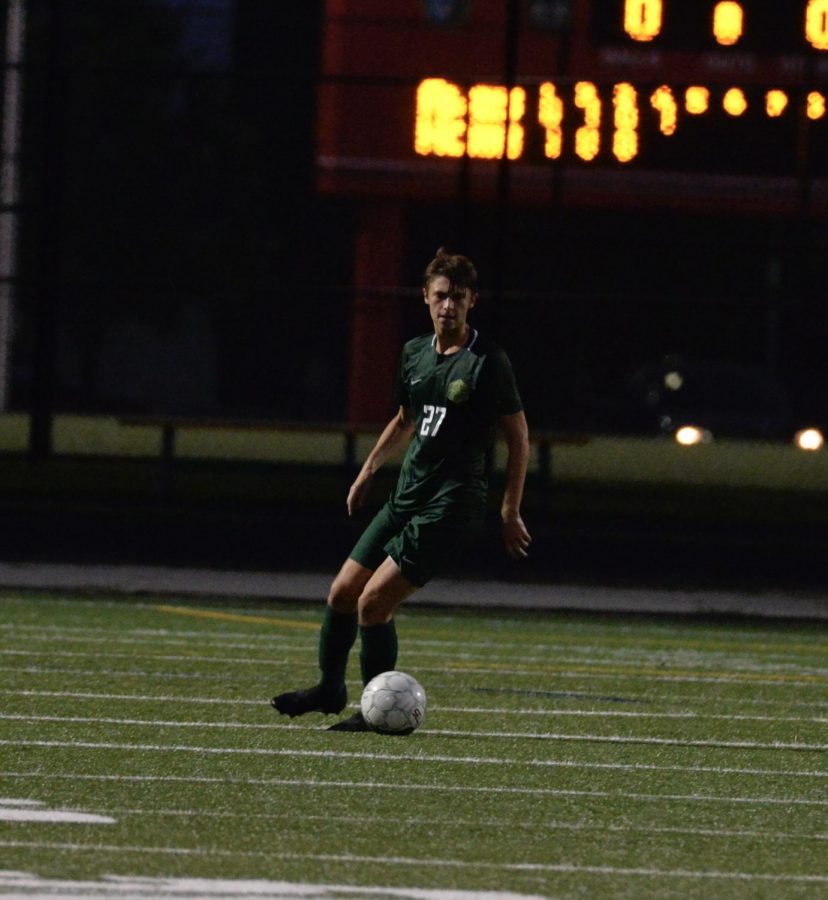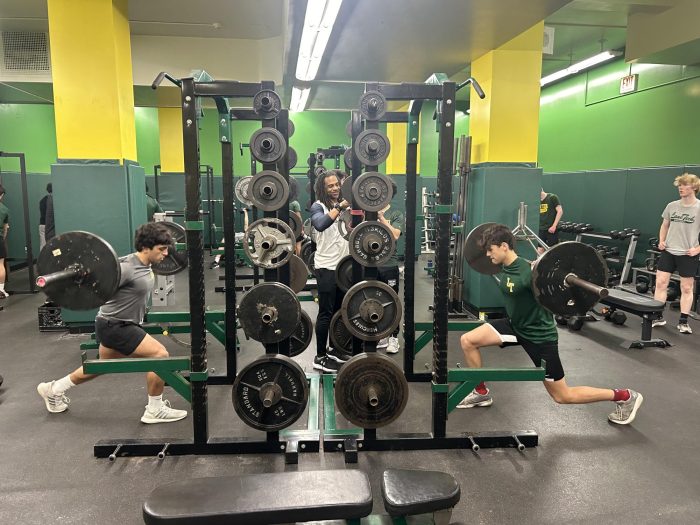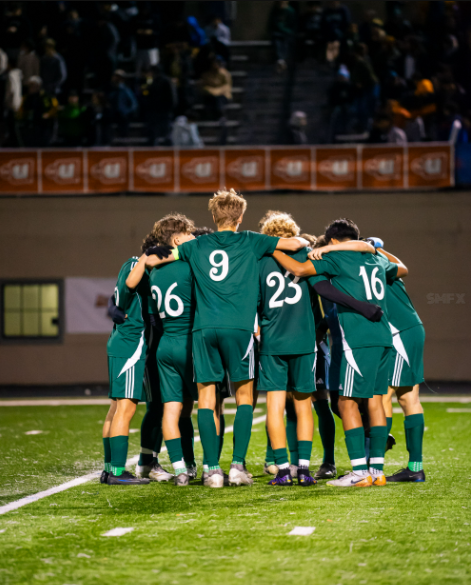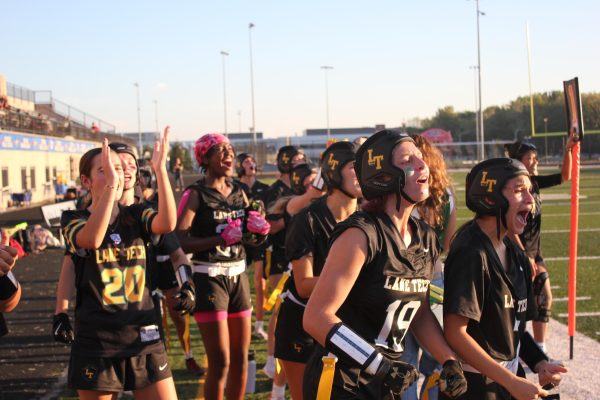OPINION: COVID has made college recruiting drastically more difficult — here’s why
Maxwell Dopp, pictured above in a August 2019 game, committed to Gettysburg College last month. (Photo courtesy of Alex Nagle)
Competing in college athletics was already difficult before the pandemic. Out of a total of eight million high school athletes in the U.S., only about 495,000 have the opportunity to compete at the next level.
But as COVID-19 is rapidly picking up, it has become even more challenging as college coaches are in a scramble to complete their 2021 recruiting class. Adam Friedman, an analyst at RIVALS, told NBC that, “College coaches were not and likely will not be able to get back out on the road anytime soon, so the only way for these coaches to get a third-party view of these players is for them to perform at camp events or workouts.”
This shows how difficult this really is for coaches to complete their classes because they have to recruit strictly off of non-game formats, which does not show a lot of abilities that some players possess. From most sports and events being cancelled, to coaches not being able to watch games — you name the cancellation — it has probably happened.
Now the real question is: how have these cancellations truly affected high school athletes being recruited?
While the NCAA originally created a dead period halting in-person recruiting for all Division 1 schools until Jan. 1, 2021, the NCAA has recently made recruiting for these Division 1 schools even more difficult. The NCAA announced Nov. 18 that the in-person recruiting dead period for Division 1 schools would be extended until April 15, 2021.
This throws a wrench in the coaches’ recruiting process for players at the Division 1 level, and also complicates things for potential student-athletes ultimately making the difficult decision on where they want to attend school.
Potential student-athletes are not allowed to do in-person visits, clinics or communicate with any coaches from Division 1 schools. This is a big problem because the main signing day for the 2021 class is Feb. 3, 2021. If a potential student-athlete has just started communicating with a coach at a Division 1 program, then they could have to make their college commitment to a school they have not even visited or a coach they have not even met.
Fran Troyan, the softball head coach at Lehigh University, told The Brown and White, Lehigh’s student newspaper, “It’s definitely hard to get a complete picture of a student-athlete when you don’t get a chance to see them in person, but we are all doing the best that we can.”
Not being able to get a full sense of a potential student-athlete makes the job of the coaches harder, in the sense that they might wait longer to make an offer to that person, and then potentially lose them to a competing program.
The NCAA dead period does not apply to Division 2 and Division 3 schools, so they are allowed to have in-person talks and allow potential student-athletes to go on visits — and most importantly they are allowed to attend camps and clinics for their sport, while still following all of the COVID-19 guidelines.
This is big because a lot of potential student-athletes do not want to take the risk of committing to a Division 1 school that they have never seen in-person before, when they can commit to a Division 3 school they have already visited.
I had a great opportunity to play at the Division 1 level, but ultimately with the lack of playing time, and not being able to go on an official visit for the school, I ultimately decided not to pursue Division 1.
Last month, I announced my commitment to continue my education and play soccer at Gettysburg College. The process was nothing like how I expected it to be because of COVID. Not being able to play games with my club team this past spring made it extremely difficult to show coaches that I play at a high level. The only way I got recruited was through camps.
These camps were filmed, and that is what coaches really only had in order to analyze my skills as a player. This made a lot of aspects that are pivotal in my game not able to be shown to coaches. Over film it is difficult to see the leadership, communication, and high IQ game sense that I have because the coach only sees the two minutes of highlights with music in the background.
With COVID, college coaches probably are getting so many emails that it is hard to see them all. After one camp that I attended in August, I sent out my highlights from that camp to about 200 schools and only got about 8 responses. One of those responses happened to be Gettysburg College. After I did my research on the school, I knew that I was highly interested in them, and I knew they were going to be at a camp that I was going to in November. I told them that I would be attending, and I ended up playing phenomenal at that camp.
Talks continued, and after three Zoom meetings with the coaching staff, an in-person visit of the school with the head coach and numerous talks with my parents, I knew Gettysburg was a place that I wanted to play at.
The postponement of most fall and winter sports in Illinois makes college recruiting for CPS students even more difficult than it usually is. CPS does not always provide the necessary elements needed for their students to become collegiate student-athletes, so it is all up to the students, and without having played a season, it is nearly impossible.
One example of this was the CPS teacher strike in 2019. All of these fall sports are about to begin competing for state championships, but were not allowed to because the teachers decided to go on strike, therefore there were no coaches able to coach the teams, causing the teams to forfeit. The teachers couldn’t have waited three more weeks for all of the seasons to be over? This shows how CPS does not provide elements because the farther teams get into the state playoffs, the more coaches that show up to watch the teams play, so if the teams can’t play, then how are the students going to be recruited?
Christin Owerko, a senior at Lane Tech and a captain on the football team, said that COVID-19 has made recruitment challenging for everyone.
“With the last signing day for football being April 1, and us not being able to play games until March 1, I am going to have to move very fast if I want a chance to play at the next level,” Owerko said. “I basically have to get recruited off of film, which does not show all of my abilities as a player and what I can bring to the team.”
If you were not recruited before the COVID-19 pandemic, the process is going to be a lot harder than it usually would be. It is hard for anybody to decide what they really want to pursue because everything has been greatly held back.
This pandemic has really opened up the option of committing to play Division 3 for the first year or two, then transferring to play Division 1 after that. According to the NCAA, 13% of Division 1 student-athletes are transfers.
The pandemic has also opened up the idea of going to Junior College or a prep school for a year, to get more exposure, and then transferring to a big school. Student-athletes go this Junior College route to either bring up their grades, get more exposure, or develop more.
Whatever goes on you have to find a positive in every negative situation and make the best decision for yourself at the end of the day, and no matter if that decision is to pursue college athletics or not, you should feel confident in your decision.
Max Dopp is a senior who recently committed to play college soccer at Gettysburg College. He also is a Warrior reporter.
Your donations directly fund the Lane Tech student journalism program—covering essential costs like website hosting and technology not supported by our school or district. Your generosity empowers our student reporters to investigate, write, and publish impactful stories that matter to our school community.
This website is more than a publishing platform—it's an archive, a research tool, and a source of truth. Every dollar helps us preserve and grow this resource so future students can learn from and build on the work being done today.
Thank you for supporting the next generation of journalists at Lane Tech College Prep!




